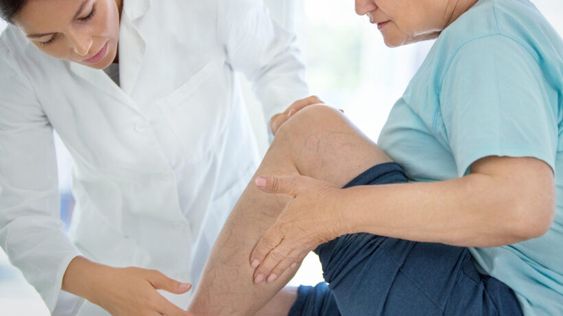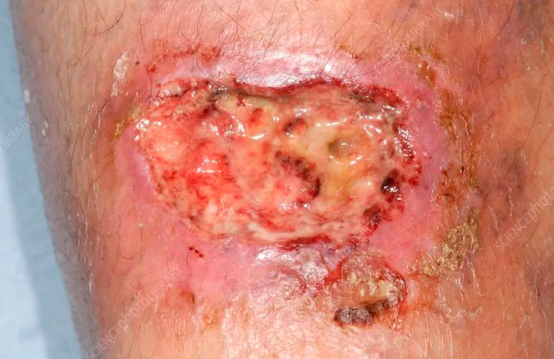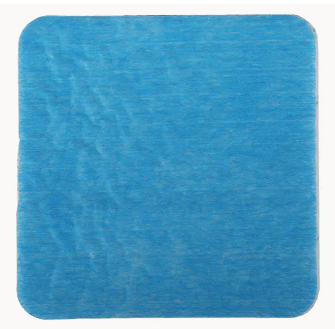Venous ulcer of the lower extremities is a common surgical disease. According to statistics, the incidence of varicose veins of lower extremities reaches 20%, the incidence of venous ulcers reaches 0.5%-3.0%, and the probability of ulcer recurrence reaches 67.0%. The rate reaches 10.0%. In addition, the ulcer area of most patients is relatively large, and the wound is difficult to heal for a long time, which has a negative impact on the health and quality of life of the patients. Therefore, the treatment of ulcer wounds is particularly important. At the same time, a large amount of infectious exudation can cause complications such as softening and tissue maceration in the surrounding skin of the ulcer area, which greatly affects the recovery of venous leg ulcer wounds and the quality of life of patients. This article will introduce to you how to protect the skin around venous ulcers of the lower extremities, please take a look with me below.
First, observe the skin around the wound:
Observe the wound bed extending 4 cm outward. The temperature of the skin around the wound, the location of the wound, the shape of the wound, the color of the wound, and the amount of exudate were observed.
Know what is exudate?
Exudate from open wounds is essential for moist wound healing. However, when the wound produces too much exudate, or when the exudate contains harmful components, the wound healing will be delayed, and it will also increase the pain of the patient and consume a large number of medical resources. The main component of exudate is water, which also contains electrolytes, nutrients, proteins, inflammatory mediators, protein-digesting enzymes (such as matrix metalloproteinases (MMPs)), growth factors, waste products, and various cells (such as neutral granulocytes, macrophages, platelets). Although wound exudate often contains microorganisms, this does not mean that the wound is infected. Normal exudate is clear, light amber in color, and low in viscosity. Exudate is generally odorless, but some dressings produce a characteristic odor that can be mistaken for exudate. Assess for exudate taking into account the type of wound tissue.
Maceration management of peri-wound skin:
Periwound skin maceration refers to the chronic inflammatory response and erosion of the peri-wound skin due to exposure to wound exudate or toxins produced by bacteria within the wound bed. Many chemical substances contained in wound exudate can irritate the skin, such as heparin-binding protein, proteolytic enzymes, inflammatory cytokines, histamine, etc., and prolonged skin contact with these fluids can cause skin damage. The role of bacteria in wounds is unclear, but periwound cellulitis may develop when bacterial proliferation reaches a certain level. When improper daily care causes leakage of wound drainage, it often causes maceration of the surrounding skin, which may further cause damage and necrosis in severe cases.
How to avoid skin maceration?
Skin changes around a wound can occur for many reasons, including exposure to exudate, allergies to dressings, or existing skin disorders. Therefore, it is particularly important to choose a suitable dressing according to the amount of exudate. To minimize the contact between the surrounding skin and the exudate, it is recommended to use a functional dressing. If there are a lot of exudates, Alginate Dressing can be used, which has good water absorption and can The final weight should be more than 5 times the original weight, to lock bacteria and proteolytic enzymes while retaining the seepage. If there are a lot of exudates, it is recommended to use Super Absorbent Innosorb Silicone. This dressing has super water absorption capacity, and the silicone contact layer can directly cover the wound without sticking to the wound, and can quickly absorb a large amount of exudate.
For more information on Innomed® super absorbent innocent silicone, refer to the previous articles. If you have customized needs, you are welcome to contact us; we will serve you wholeheartedly.
At Longterm Medical, we transform this data by innovating and developing products that make life easier for those who need loving care.
Editor: kiki Jia
Date: January 3, 2023

 English
English عربى
عربى Español
Español русский
русский 中文简体
中文简体








